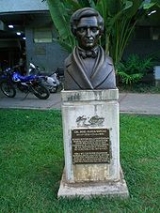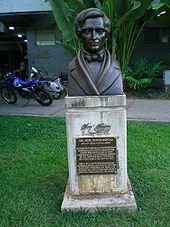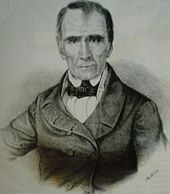
José María Vargas
Encyclopedia
José María Vargas was the 4th President of Venezuela from 1835–1836.
struck on 26 March, Vargas, who was in La Guaira
, lent his services as a doctor and public man to the community of his native city. After the events of the 1812 earthquake, Vargas returned to Cumaná to dedicate himself to his medical work. When the Royalist troops of Juan Francisco Javier Cervériz entered Cumaná
, they incarcerated all the members of the Legislative Council, including Vargas- who was sent to the vaults of La Guaira where he remained until his release in 1813. By the end of that year, he embarked to Europe to perfect his medical and surgical knowledge. During this time he studied surgery
, chemistry
, botany
, anatomy
and odontology. Also, at that time, he was admitted into the Royal College of Surgeons
in London, as a member.
; here too were his brothers and his mother as refugees, having fled the bloody Venezuelan War of Independence
. In Puerto Rico he developed important professional and scientific work, writing numerous works and collaborating in addition with the island's Organization of Health. In 1825, he decided to return to Venezuela
definitively. From his arrival he immediately dedicated himself to exercising his profession, eventually becoming a professor of anatomy
at the University of Caracas. In 1827, after the reorganization of this university by Simón Bolívar
, he was elected 'director', the first medical director, as per the new statutes. It is then that Vargas receives the recognition and the respect of diverse sectors of Caracas' society due to his successful administrative work; besides adjusting the rent of the university, he dedicated himself to reorganizing the diverse faculties, the maintenance of the premises, the organization of the libraries, and networking the university with other establishments. Consequently, at the end of his performance as a director, the university become a model of administrative effectiveness and a prestigious training center.
 As an anatomy professor, inaugurated in Venezuela the dissection of corpses, a procedure that was extremely new for the time, and which conferred on him extraordinary reputation as a professor. In 1827 he founded the Medical Society of Caracas, which begun the practice of scientific assemblies in Venezuela. During this period he developed ample work in the investigation of botany, which took him throughout the world to establish relations with remarkable men of this science like Candolle, one of the greatest botanists of the time and who baptized some plants with the name of Vargasia in tribute to Vargas' works. In 1829, when the Economic Society of Friends of the Country is founded, Vargas was designated as its first director.
As an anatomy professor, inaugurated in Venezuela the dissection of corpses, a procedure that was extremely new for the time, and which conferred on him extraordinary reputation as a professor. In 1827 he founded the Medical Society of Caracas, which begun the practice of scientific assemblies in Venezuela. During this period he developed ample work in the investigation of botany, which took him throughout the world to establish relations with remarkable men of this science like Candolle, one of the greatest botanists of the time and who baptized some plants with the name of Vargasia in tribute to Vargas' works. In 1829, when the Economic Society of Friends of the Country is founded, Vargas was designated as its first director.
Once he concluded his administrative work in the university, Vargas dedicated himself completely to education, founding in 1832 the Faculty of Surgery. Simultaneously with his scientific and educative activities, Vargas took part in political activities, attending the Constituent Congress of 1830, where he was very active in the work commissions; in the plenary sessions (and in many other opportunities) he abstained from voting, as he discorded with some expositions of Simón Bolívar
. Nevertheless, Bolívar named him his testamentary executor.
 In 1834, when talk of the candidates for the presidential period (1835–1839) began, his name was mentioned with great insistence in intellectual circles, which somehow expressed certain antimilitarist attitude. In 1835 political power in Venezuela
In 1834, when talk of the candidates for the presidential period (1835–1839) began, his name was mentioned with great insistence in intellectual circles, which somehow expressed certain antimilitarist attitude. In 1835 political power in Venezuela
was exerted chiefly by the military leaders of the Independence process, and for this reason certain sectors tried to reinforce civil power by means of the prestigious figure of Jose María Vargas.
He was elected president in the elections of 1834, and ratified by Congress on 6 February 1835, and in 9 February was in charge of the presidency.
In 8 July 1835 exploded the Revolution of Reforms that demoted him from his position, and he was sent to Saint Thomas
. Nevertheless, he was restituted in the first magistrature, as soon as José Antonio Páez
and the constitutional army defeated the rebels. Vargas continued to be President of the Republic until April 1836, date in which he resigned irrevocably from this position.
After his experience as first magistrate, he dedicated himself exclusively to education for the rest of his life.
, the body of the Liberator Simón Bolívar
and taking it to Venezuela
, a task that was completed in December 1842. In August 1853, feeling ill, he traveled to the United States, where he resided first in Philadelphia
and then in New York City, where finally he died in 13 July 1854. In 1877, his body was brought to Caracas
and buried in the Panteón Nacional
on 27 April 1877.
Life and career
Medical surgeon, scientist, university professor and head of the University of Caracas, politician, writer and president of Venezuela. Son of Canarian merchant José Antonio de Vargas Machuca and Venezuelan Ana Teresa Ponce. In 1798, began studies at the Royal and Pontifical University of Caracas, graduating as bachelor in philosophy in 11 July 1803. He received his degree of bachelor, lawyer and doctor in medicine in 1808. After finishing his medical studies, he transferred to Cumaná, where he lived until 1812, lapse in which he was elected to the Supreme Legislative Council of Cumaná (1811) in the context of the Venezuelan independence movement. When the 1812 Caracas earthquake1812 Caracas earthquake
The 1812 Caracas earthquake took place in Venezuela on March 26, 1812 at 4:37 p.m. It measured 7.7 on the Richter magnitude scale. It caused extensive damage in Caracas, La Guaira, Barquisimeto, San Felipe, and Mérida...
struck on 26 March, Vargas, who was in La Guaira
La Guaira
La Guaira is the capital city of the Venezuelan state of Vargas and the country's chief port. It was founded in 1577 as an outlet for Caracas, to the southeast. The town and the port were badly damaged during the December 1999 floods and mudslides that affected much of the region...
, lent his services as a doctor and public man to the community of his native city. After the events of the 1812 earthquake, Vargas returned to Cumaná to dedicate himself to his medical work. When the Royalist troops of Juan Francisco Javier Cervériz entered Cumaná
Cumaná
Cumaná is the capital of Venezuela's Sucre State. It is located 402 km east of Caracas. It was the first settlement founded by Europeans in the mainland America, in 1501 by Franciscan friars, but due to successful attacks by the indigenous people, it had to be refounded several times...
, they incarcerated all the members of the Legislative Council, including Vargas- who was sent to the vaults of La Guaira where he remained until his release in 1813. By the end of that year, he embarked to Europe to perfect his medical and surgical knowledge. During this time he studied surgery
Surgery
Surgery is an ancient medical specialty that uses operative manual and instrumental techniques on a patient to investigate and/or treat a pathological condition such as disease or injury, or to help improve bodily function or appearance.An act of performing surgery may be called a surgical...
, chemistry
Chemistry
Chemistry is the science of matter, especially its chemical reactions, but also its composition, structure and properties. Chemistry is concerned with atoms and their interactions with other atoms, and particularly with the properties of chemical bonds....
, botany
Botany
Botany, plant science, or plant biology is a branch of biology that involves the scientific study of plant life. Traditionally, botany also included the study of fungi, algae and viruses...
, anatomy
Anatomy
Anatomy is a branch of biology and medicine that is the consideration of the structure of living things. It is a general term that includes human anatomy, animal anatomy , and plant anatomy...
and odontology. Also, at that time, he was admitted into the Royal College of Surgeons
Royal College of Surgeons of England
The Royal College of Surgeons of England is an independent professional body and registered charity committed to promoting and advancing the highest standards of surgical care for patients, regulating surgery, including dentistry, in England and Wales...
in London, as a member.
Return to America
From his return to the American continent in 1819, he resided in the island of Puerto RicoPuerto Rico
Puerto Rico , officially the Commonwealth of Puerto Rico , is an unincorporated territory of the United States, located in the northeastern Caribbean, east of the Dominican Republic and west of both the United States Virgin Islands and the British Virgin Islands.Puerto Rico comprises an...
; here too were his brothers and his mother as refugees, having fled the bloody Venezuelan War of Independence
Venezuelan War of Independence
-The First Republic:Criollos resented the mercantilist policies of Spain. Trade was only allowed in Pacific ports which was a terrible burden for Argentina, Paraguay and the Caribbean colonies. This is significant as Cuba and Puerto Rico were forced to allow free trade in 1763 by Britain and...
. In Puerto Rico he developed important professional and scientific work, writing numerous works and collaborating in addition with the island's Organization of Health. In 1825, he decided to return to Venezuela
Venezuela
Venezuela , officially called the Bolivarian Republic of Venezuela , is a tropical country on the northern coast of South America. It borders Colombia to the west, Guyana to the east, and Brazil to the south...
definitively. From his arrival he immediately dedicated himself to exercising his profession, eventually becoming a professor of anatomy
Anatomy
Anatomy is a branch of biology and medicine that is the consideration of the structure of living things. It is a general term that includes human anatomy, animal anatomy , and plant anatomy...
at the University of Caracas. In 1827, after the reorganization of this university by Simón Bolívar
Simón Bolívar
Simón José Antonio de la Santísima Trinidad Bolívar y Palacios Ponte y Yeiter, commonly known as Simón Bolívar was a Venezuelan military and political leader...
, he was elected 'director', the first medical director, as per the new statutes. It is then that Vargas receives the recognition and the respect of diverse sectors of Caracas' society due to his successful administrative work; besides adjusting the rent of the university, he dedicated himself to reorganizing the diverse faculties, the maintenance of the premises, the organization of the libraries, and networking the university with other establishments. Consequently, at the end of his performance as a director, the university become a model of administrative effectiveness and a prestigious training center.
Professor

Once he concluded his administrative work in the university, Vargas dedicated himself completely to education, founding in 1832 the Faculty of Surgery. Simultaneously with his scientific and educative activities, Vargas took part in political activities, attending the Constituent Congress of 1830, where he was very active in the work commissions; in the plenary sessions (and in many other opportunities) he abstained from voting, as he discorded with some expositions of Simón Bolívar
Simón Bolívar
Simón José Antonio de la Santísima Trinidad Bolívar y Palacios Ponte y Yeiter, commonly known as Simón Bolívar was a Venezuelan military and political leader...
. Nevertheless, Bolívar named him his testamentary executor.
President

Venezuela
Venezuela , officially called the Bolivarian Republic of Venezuela , is a tropical country on the northern coast of South America. It borders Colombia to the west, Guyana to the east, and Brazil to the south...
was exerted chiefly by the military leaders of the Independence process, and for this reason certain sectors tried to reinforce civil power by means of the prestigious figure of Jose María Vargas.
He was elected president in the elections of 1834, and ratified by Congress on 6 February 1835, and in 9 February was in charge of the presidency.
In 8 July 1835 exploded the Revolution of Reforms that demoted him from his position, and he was sent to Saint Thomas
Saint Thomas, U.S. Virgin Islands
Saint Thomas is an island in the Caribbean Sea and with the islands of Saint John, Saint Croix, and Water Island a county and constituent district of the United States Virgin Islands , an unincorporated territory of the United States. Located on the island is the territorial capital and port of...
. Nevertheless, he was restituted in the first magistrature, as soon as José Antonio Páez
José Antonio Páez
José Antonio Páez Herrera was General in Chief of the army fighting Spain during the Venezuelan Wars of Independence, in addition to becoming the President of Venezuela once it was independent of the Gran Colombia...
and the constitutional army defeated the rebels. Vargas continued to be President of the Republic until April 1836, date in which he resigned irrevocably from this position.
After his experience as first magistrate, he dedicated himself exclusively to education for the rest of his life.
Last years and legacy
During this stage of his existence, he assumed the presidency of the Main directorate of Public Instruction, which he exerted from 1839 to 1852. Also, he continued giving his classes on anatomy and surgery at the University, founding in addition in 1842 the Faculty of Chemistry. He also presided the commission in charge of exhuming in Santa Marta, ColombiaColombia
Colombia, officially the Republic of Colombia , is a unitary constitutional republic comprising thirty-two departments. The country is located in northwestern South America, bordered to the east by Venezuela and Brazil; to the south by Ecuador and Peru; to the north by the Caribbean Sea; to the...
, the body of the Liberator Simón Bolívar
Simón Bolívar
Simón José Antonio de la Santísima Trinidad Bolívar y Palacios Ponte y Yeiter, commonly known as Simón Bolívar was a Venezuelan military and political leader...
and taking it to Venezuela
Venezuela
Venezuela , officially called the Bolivarian Republic of Venezuela , is a tropical country on the northern coast of South America. It borders Colombia to the west, Guyana to the east, and Brazil to the south...
, a task that was completed in December 1842. In August 1853, feeling ill, he traveled to the United States, where he resided first in Philadelphia
Philadelphia, Pennsylvania
Philadelphia is the largest city in the Commonwealth of Pennsylvania and the county seat of Philadelphia County, with which it is coterminous. The city is located in the Northeastern United States along the Delaware and Schuylkill rivers. It is the fifth-most-populous city in the United States,...
and then in New York City, where finally he died in 13 July 1854. In 1877, his body was brought to Caracas
Caracas
Caracas , officially Santiago de León de Caracas, is the capital and largest city of Venezuela; natives or residents are known as Caraquenians in English . It is located in the northern part of the country, following the contours of the narrow Caracas Valley on the Venezuelan coastal mountain range...
and buried in the Panteón Nacional
Panteón Nacional
The Panthéon is a building in the northern edge of the old town of Caracas, Venezuela. It was originally built as a church, but is now used as a famous burial place...
on 27 April 1877.
See also
- VenezuelaVenezuelaVenezuela , officially called the Bolivarian Republic of Venezuela , is a tropical country on the northern coast of South America. It borders Colombia to the west, Guyana to the east, and Brazil to the south...
- Presidents of Venezuela
- Central University of VenezuelaCentral University of VenezuelaThe Central University of Venezuela is a premier public University of Venezuela located in Caracas...

